- Home
- Neal Stephenson
The Rise and Fall of D.O.D.O.: A Novel Page 29
The Rise and Fall of D.O.D.O.: A Novel Read online
Page 29
“Les Holgate,” I say.
“The same,” he says, and he holds his outstretched hand toward me. I look at it, wondering if I am expected to kiss it, which I’ve no intention of doing. So I wait. After a moment, he drops it onto his lap. “You must be Gráinne.” He pronounces it wrong and he knows it.
“Why must I? And what business is it of yours if I am?”
“I’m a colleague of Tristan Lyons. You know, from the future?”
“I know.”
“I’m here to help him with his deed.” He pats his hands on the bombast of his hosen, then crosses his arms, then puts his arms akimbo, as if arms are something he’s just acquired and hasn’t yet worked out what they’re good for.
“A colleague, are you now?” I ask. “Let’s have you prove it. Tell me a bit about his deed, and why he would be needing your help, and what kind of help you’re intending to give him.”
“We have no time for that,” he says, frowning. To be honest he looks almost confused that I would be questioning him. Quite peremptory he seems to me.
“I have no time for foolishness,” I retort. “These are dangerous times and I dare not take a stranger at’s word. I’m needing evidence you’re Tristan’s fellow. Tell true.”
Mr. Anomaly harrumphed a bit at that. Then he pushed his hair back, rubbed his hands together, and said briskly, “We are trying to disincent Sir Edward Greylock from investing in the Boston Council. Tristan has tried speaking to him on multiple occasions but the results we seek have yet to eventuate.”
“And those results are?” I asked.
Irked he looked, as if it were an imposition to speak of it. “The removal of a certain building forty years from now in Massive Shoe Hits.”
I continued to question him in this vein, with his impatience and irritation compounding, until, despite his queer language and displeasing attitude, I had satisfied myself that he was indeed on Tristan’s crew, and served the same masters, with the same ends in mind.
“So what exactly are you here to do?” I concluded my questioning.
“We’ve figured out a better way to change Sir Edward’s mind about where to put his money,” he says. “Since Tristan was already here, in 1601, we couldn’t give him the new instructions, so we’ve called an audible and made an unplanned insertion. I’ve got some specific plans to enact, and I need your help just like you’ve been giving it to Tristan.”
“As long as you understand what I have not been giving to Tristan,” I say, for his talk of insertions was putting me on my guard. He was not near so comely as Tristan and I didn’t want him to be making any insertions on my person. But he gave me a strange look, as if he hadn’t the faintest idea what I was referring to. “Certes,” I said, letting it go. “I am in league with Tristan so by association I am in league with you. Be stating your intentions, O man from the future.”
“I’m going to put Sir Edward between a rock and a hard place. Make him an offer he can’t refuse. Turn up the heat.”
“All right,” I said cautiously.
“Yeah. Here’s the plan. The Constable of this parish? St. Mildred’s?”
“I know what parish we are in,” I told him.
“He’s poor. Easily corrupted,” he tells me. I reckon he must know this from his history books—and don’t I know it from my own life! “Introduce me to that Constable. And then, separately, introduce me to one Simon Beresford—the father of Sir Edward’s fiancée.”
“Why’s that, then?” I asked.
“Well, Sir Edward uses this whorehouse, right?”
“Once or twice,” I said.
“There’s a girl here he likes, Tristan told me.”
“That would be Morag. Bit of a gymnast she is.”
“We have to get the Constable to inspect the whorehouse while Sir Edward is here with her—and Sir Edward’s future father-in-law is with him on a ride-along.”
“On a what?” I asked. I did not like his attitude or his strange accent or queer way with words and phrases.
I did not like the notion that Tearsheet would be inspected, but in truth, all the bawdy-houses are targets occasionally and isn’t Tearsheet overdue for it, on account of my magic fending it off so long. Often’s the time a parish constable will squeeze a whoremonger for money. Constables are given power but no money at all, and so usually held by somebody with a high enough opinion of themselves, who happens to be short on coin. “Well enough,” I said. “But Simon Beresford? The father-in-law-to-be?”
“Yeah, I don’t know where to track him down. He’s a lord or something. Knows the Queen. We have to get him to go with the Constable on the inspection.”
“And why would he do such a thing?”
“So that he can report to Queen Elizabeth which of her courtiers was caught in the whorehouse.” He seemed chuffed with himself for this idiot scheme. His arms—when he wasn’t using them to push his hair out of his eyes—hung more casually at his sides now, as if he’d grown accustomed to them. He was finding his sea legs, as Your Grace’s men might say.
“Hardly seems like something a gentleman would care to do,” I pointed out.
“Good way to win points,” himself said confidently, in that tone that says: he has made up his mind about it, and therefore any new information or suggestion has the weight of mist. “Also, if we drop a hint that his future son-in-law might be one of those in the brothel, then Simon Beresford will have a pressing need to see for himself who comes out of the brothel door during the raid.”
I shrugged. “There are hidden exits on every floor for the customers to leave unnoticed,” I said. “Constables have sought them out for years and never found them, it’s a matter of great pride at Tearsheet. Morag knows those exits same as any of us, she’ll take Sir Edward out of there to safety.”
“No she won’t,” said Les Holgate. “I’ll be blocking the exit on that floor. Sir Edward can only get out if I let him.”
I wasn’t so sure about trusting this fellow now, he had such a different sensibility to him than your man Tristan.
He goes on: “I’ll show up at the same time as Beresford and the Constable. You should be in the whorehouse and protest, make a fuss, follow us around. When we find Sir Edward and Morag, you make enough of a fuss to distract the Constable, and I’ll pull Edward aside and offer him a get-out-of-jail-free card: he can run out the front door and be seen by Simon Beresford, and kiss his social-climbing marriage goodbye forever. Or, I’ll get him out safely and Simon Beresford will never know he’s there—but I’ll only do that if he signs his name to an oath, that he will never fund the Boston Council, no questions asked. Got it?”
Absurd, I thought it. Dull-witted. Absolutely mental. But I nodded, grimacing.
So: that was the plan. That is not what happened.
This scheme—this accursed scheme!—was easy enough to begin because of how the stars were aligned. I spoke to Morag, and explained a little of what we were up to—not about Les Holgate being from the future or such details, just that we needed to blackmail her newest customer and she’d be recompensed for her cooperation. Pym the owner has a strict no-blackmailing policy at Tearsheet, but it only applies to blackmail that he knows about, and Morag (being Scottish) is resourceful. To my request, she laughs and says, “Well, Sir Edward and I do have a special little romp planned for tomorrow afternoon. If you want to catch him in the act, this will be the act to catch him in. This will be an act for all the ages to speak of.” And she laughs with such abandon that I can’t help but be a wee bit curious, suspicious even, of what she’s on about, so I ask her.
“What are you on about?” I ask her.
She sobers right up, although her eyes look like the laughter will still come spilling out of them. “Ach, I might have no morals, but I certainly have manners,” she says. “I’ll not reveal a gentleman’s proclivities.” (For doesn’t she like to show off her schooling with these fancy new words.) “But I know he’ll be arriving here just as the bells toll two, so come at h
alf-two and you’ll get at least as much as you’re seeking.” And we’d have to pay her well for that, for it’s true her lips are generally as tight as her character is loose. She’s the one the fellas ask for when it’s especially secret they need to be. She valued her reputation that way, so hard up for money she must have been, if she was willing to play our game with us. Now I’ll always wonder about that.
’Twas easy enough to find the Constable, as he’s also the manager of the bear-baiting pit, so he’s always around Southwark. The Constable is a funny enough fella, perhaps on account of his line of work. His assistants, who feed the bears and file down their teeth, are large fellas, and fierce, but he’s entirely different. Mild and obsequious at once, he is, and doesn’t he smile deferentially even as he regrets to inform you that he’ll be taking advantage.
I did him a good turn once. The bears don’t take to himself or his lads much, yet he’s the one keeps them alive and healthy, for isn’t a bear a terrible expensive thing to come by? Anyhow, I reasoned with a bear whose wounds he was salving, and the bear stopped trying to smack him. So he owed me a favor for a couple of years now. This turned out to be useful.
Les Holgate believed the Constable would leap spurs-first at the opportunity to intimidate Pym, the Tearsheet brewer. He did not take into account that the Constable was less inclined to upbraid brewers than bears, for an upbraided brewer is less likely to pass you a pint. It’s a good thing the Constable was under a compliment to me, for he only agreed to Les’s scheme as a kindness to myself. So in the end, he did agree to put on his constabulary cap and go inspecting the “tavern” the next afternoon.
Les Holgate next wished me to go with him to find this Simon Beresford and induce him to come along with us, but ’twould take more of my time than I’d a wish to give it. So I declined, but (believing I was still abetting a scheme that Tristan was a part of) I did offer to find out Simon Beresford’s location, so that Les might go and fetch the fellow his own self.
This I did, the next day (Les Holgate having slept on a tavern bench overnight and whinging all the next morning). Simon Beresford was on London Bridge seeking to purchase a new hat.
As soon as Les Holgate had set out for the Bridge, up to my own closet I went, and sought out Tristan by scrying, as I knew he and Rose should be on their way back through the city, headed my way. It seemed to me they were by the Paris Gardens. I sent to Rose as much of this message as I could, which was hard to communicate since she wasn’t expecting me to try to reach her: “Your man Les Holgate has arrived and plans to use extortion to accomplish the task at Tearsheet.” So I hoped Tristan would have at least a notion that mischief might be afoot.
Then I went back into the tavern and sat back with a mug of Tearsheet Best Bitter, the finest ale you can find outside of Ireland, and waited to see who would return first. It was quiet in there for the time of day, perhaps half a dozen drinkers. I had no personal need to see the scheme succeed, and guessed it would be a lark to watch. But I did feel the slightest bit of unease deep in my gut, and I hoped Tristan would return, as he had a gravity to him that put me at ease, while this Holgate fella made me a bit squeaky-bummed.
No surprise it was that Les Holgate returned first, with a confused-looking older fella who had to have been Simon Beresford. He was dressed in the old style, all in elegant black, prudish but not quite Puritan (for then his daughter wouldn’t have been one of Elizabeth’s ladies, of that I’m confident). His ruffle was pretentious—as if his head sat on a fancy platter that just happened to be balanced right on the top of his neck. Hard to imagine a fellow like that shopping for himself on London Bridge, but it takes all sorts. I heard his voice out in the street, old enough for childish treble. He was asking someone for an explanation. Answers were coming both from Les Holgate and from a third voice I recognized as belonging to the Constable.
In the tavern I was, as they approached, and wasn’t the doorway open to let in the glorious autumn day, so they stood in the door backlit. Proprietor Pym recognized the Constable by his silhouette, and cursed under his breath. He went out the door, shooing at them, and made a fuss about letting them in, even as the old fella protested he had no interest in setting foot in such an establishment. I followed Pym out just to keep an eye on things.
So, here we all are standing on the gravel street, just outside the brewery door, with throngs of people pushing by us going to the theatre or from the bear-baiting. We were myself, the Constable, Les Holgate, Simon Beresford, and Proprietor Pym. Inside upstairs, of course, were Morag and Sir Edward, carrying on blissfully unawares.
The Constable shoulders Pym out of the way and strides into the tavern, where right off all the customers make a bit of a fuss, like hens in a coop when the farmer comes in after dark.
“Stay outside, sir,” says Les Holgate to Simon Beresford. “It’s not a proper place for a gentleman like yourself to be seen. Stay here and note who comes out.” And then he rushes in after the Constable. I follow after him. And so leaving Master Pym and Simon Beresford outside on the street (with Simon Beresford so dismayed and perplexed to find himself here at all), the trio of the Constable, Les Holgate, and myself are rushing through the tavern to the steep steps that lead to the rooms. We’re not making noise ourselves, but the tavern regulars are making noise enough to surely alert everyone on the floor above. The wenches in the tavern duck under tables, until they realize the Constable isn’t after them at all, then they either return to their work or scurry out the hidden door, just to be safe.
Now up the steep stairs it is we’re going: Constable, Les Holgate, myself. It isn’t too dark at all on the landing, not on a Harvest-season afternoon with unwonted bright sun outside shining in through a small open window. The upstairs, as perhaps I’ve described to Your Grace, has a narrow corridor with rooms off either side, first a couple of rooms big enough for private conferences, and then beyond them, four wee curtained-off closets for more intimate congress. It’s Morag’s closet we’re wanting, and that’s the first curtain to the right after the meeting rooms. It’s the largest of the lot, some three strides square, with a mattress on the floor, and a curtained window what looks out over the street.
We rush past the two meeting rooms, both with doors ajar letting light through the windows, both empty (it’s day, and these are the sorts of rooms more used to candlelight). Following Les Holgate’s, commands, aren’t I tugging at the Constable’s sleeve and complaining of his being here.
We come to Morag’s curtained doorway. Les Holgate tugs open the curtain. And there’s the unglazed window with the afternoon sunlight tempered only slightly by a linen kerchief, so we can see clear as if we were standing in a market square. The Constable, Les Holgate, and myself fill the cramped doorway, with me cackling like an angry hen—until I see what is happening inside the wee room, and then my voice does fail me.
Your Majesty, I can scarce bring myself to write what we do see there. For it is not Morag there with Sir Edward, but Sir Edward with a third party altogether. From Morag’s tone the day before, I confess I had expected a surprise. But I had assumed it might be another wench.
It is not. ’Tis a man, and he and Sir Edward are at it with each other, which is a hanging offence here. Morag is not even present. She was but a cover for them to be together. The two men freeze and stare up at the three of us crowded at the doorway so, and quickly part.
Les Holgate looks very surprised, but I ken he doesn’t understand how dreadful this situation is. Tristan told me that in their age, it’s only the most religious of zealots (belonging largely to sects of churches that do not even exist in our day) who are much bothered about buggery. In his day, ’tis lawful and unremarkable—even in London! So I’m thinking Les Holgate does not understand that he is looking at two dead men. Unless we can bribe the Constable with a lot of money straightaway.
But I’ll be honest, that’s not the only thing that shocks me. It is the fellow Sir Edward’s buggering that shocks me more. For a famous bloke it
is. A very famous bloke.
There is a commotion back down the corridor, of somebody climbing up the stairs in a hurry, clear enough to hear due to our amazed silence. The Constable is goggle-eyed, and finally he says, “I cannot believe what I am seeing. The heralds and the chronicles will never let us hear the end of this. Never.” Myself, I can’t stop staring at the two men. At the one man in particular. For that man—the famous man—is my lover. Who I believed until that moment hadn’t a secret from me in all the world.
The scuffling on the stairs has turned into footsteps beating their way down the short corridor, and suddenly there’s a heaving Tristan Lyons, who grabs Les Holgate and shoves him back down the corridor toward the steps. “You fucking moron,” he says, but then immediately turns his attention back into the room. Pushes the Constable out of the way, he does, and sees the two on the ratty mattress. He points to my darling, sitting there staring at me wide-eyed and naked beside Sir Edward, and asks, “Who is that?”
I could barely make myself speak the words. “That,” I said, “is Christopher Marlowe.”
Tristan frowned in confusion. “Christopher Marlowe is dead. He died in 1593 in a pub brawl. It’s almost the only thing I know about him.”
Kit and I are staring at each other with a shared look of stupidity I did not think either one of us capable of. “A counterfeit death, it was,” I say, my chest tight. “Staged, for convenience sake. He was a spy, so he was—”
“Gracie,” says Kit in a quiet, warning voice.
“Sure it came out after, everyone knows you’re a spy by now anyhow,” I said. And explaining to Tristan: “I had just been Sent from Ireland, and so in love with him I fell, and him with me, we would do whatever we asked of each other.” Those huge, beautiful brown eyes of his bored deep into mine as I spoke, as I gave away the secret I had kept for years, kept even (I pray you forgive me) from you, Your Majesty: “’Twas the greatest bit of magic I have ever done. He told me they needed to counterfeit a wound that would give him the freedom of seeming to have died, but it must be so thoroughly accomplished that even a physician examining his body would reckon him dead. So they claimed there was a pub brawl, and a spell of protection didn’t I put on him, that when he was stabbed, he seemed dead but wasn’t, although he was close to the shadows for awhile. Then I spirited him away and nursed him back to health in secret.” And still those eyes how they looked at me, and how I looked at them. “And for these eight years gone,” I went on, “in secret I have loved him and he’s loved me. I knew he had other dalliances and I was not jealous of him. But the secreting of it—oh, Kit—the concealment, in my own home—”

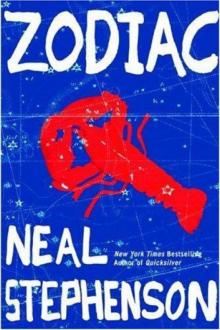 Zodiac: The Eco-Thriller
Zodiac: The Eco-Thriller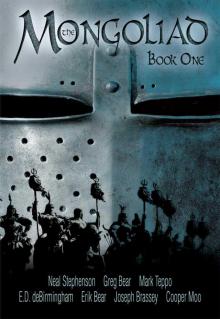 The Mongoliad: Book One
The Mongoliad: Book One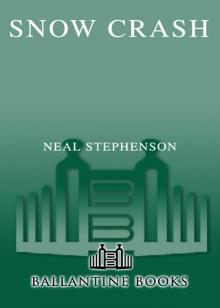 Snow Crash
Snow Crash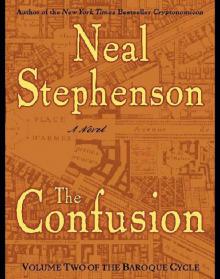 The Confusion: Volume Two of the Baroque Cycle
The Confusion: Volume Two of the Baroque Cycle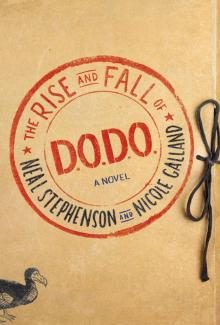 The Rise and Fall of D.O.D.O.
The Rise and Fall of D.O.D.O.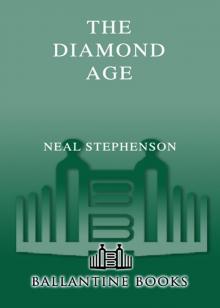 The Diamond Age: Or, a Young Lady's Illustrated Primer
The Diamond Age: Or, a Young Lady's Illustrated Primer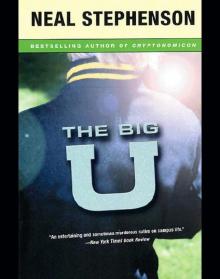 The Big U
The Big U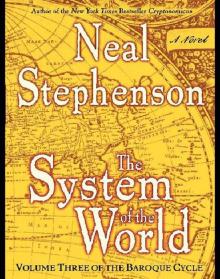 The System of the World: Volume Three of the Baroque Cycle
The System of the World: Volume Three of the Baroque Cycle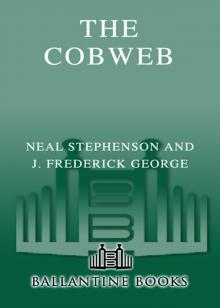 The Cobweb
The Cobweb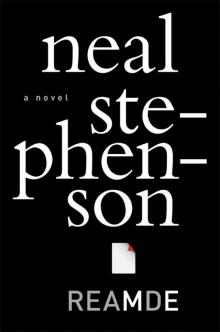 Reamde
Reamde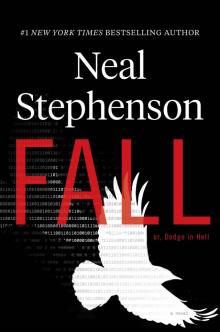 Fall; or, Dodge in Hell
Fall; or, Dodge in Hell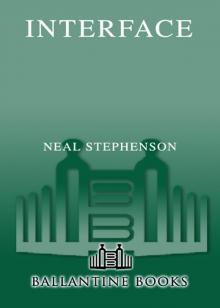 Interface
Interface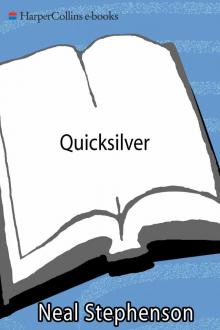 Quicksilver
Quicksilver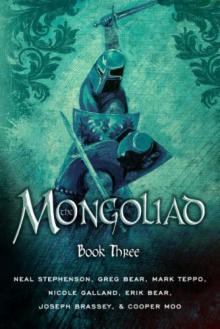 The Mongoliad: Book Three
The Mongoliad: Book Three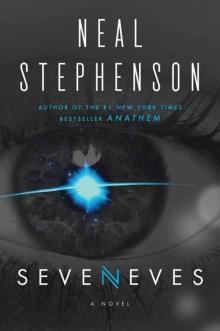 Seveneves
Seveneves Atmosphæra Incognita
Atmosphæra Incognita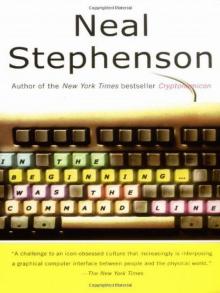 In the Beginning...Was the Command Line
In the Beginning...Was the Command Line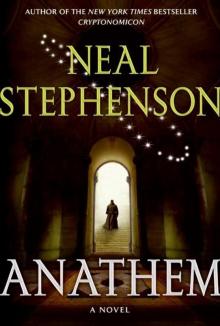 Anathem
Anathem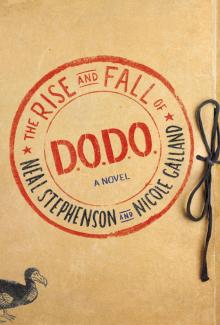 The Rise and Fall of D.O.D.O.: A Novel
The Rise and Fall of D.O.D.O.: A Novel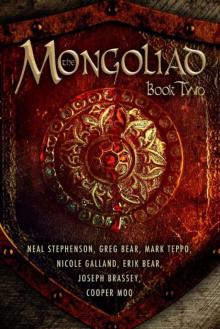 The Mongoliad: Book Two
The Mongoliad: Book Two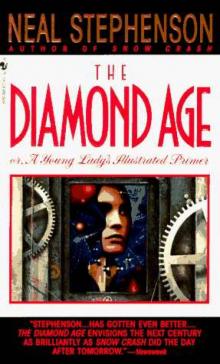 Diamond Age or a Young Lady's Illustrated Primer
Diamond Age or a Young Lady's Illustrated Primer THE System OF THE WORLD
THE System OF THE WORLD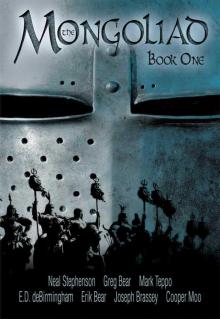 The Mongoliad: Book One tfs-1
The Mongoliad: Book One tfs-1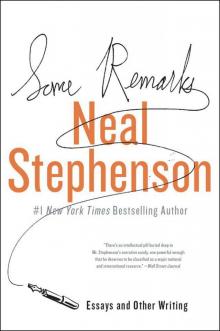 Some Remarks: Essays and Other Writing
Some Remarks: Essays and Other Writing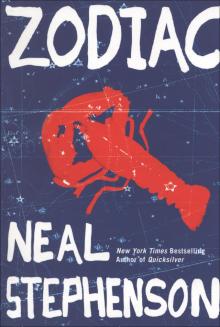 Zodiac
Zodiac Spew
Spew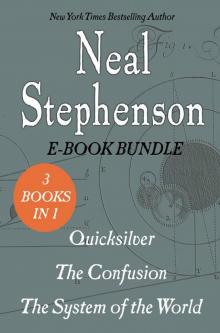 The Baroque Cycle: Quicksilver, the Confusion, and the System of the World
The Baroque Cycle: Quicksilver, the Confusion, and the System of the World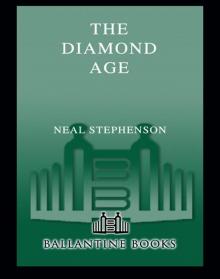 The Diamond Age
The Diamond Age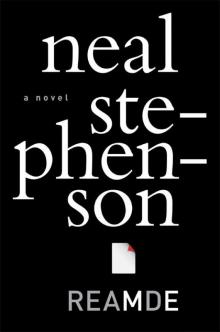 Reamde: A Novel
Reamde: A Novel In the Kingdom of Mao Bell
In the Kingdom of Mao Bell Mother Earth Mother Board
Mother Earth Mother Board Twelve Tomorrows - Visionary stories of the near future inspired by today's technologies
Twelve Tomorrows - Visionary stories of the near future inspired by today's technologies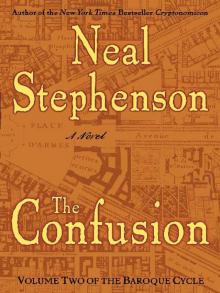 The Confusion
The Confusion The Great Simoleon Caper
The Great Simoleon Caper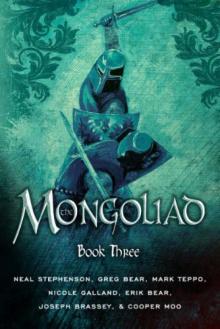 The Mongoliad: Book Three tfs-3
The Mongoliad: Book Three tfs-3